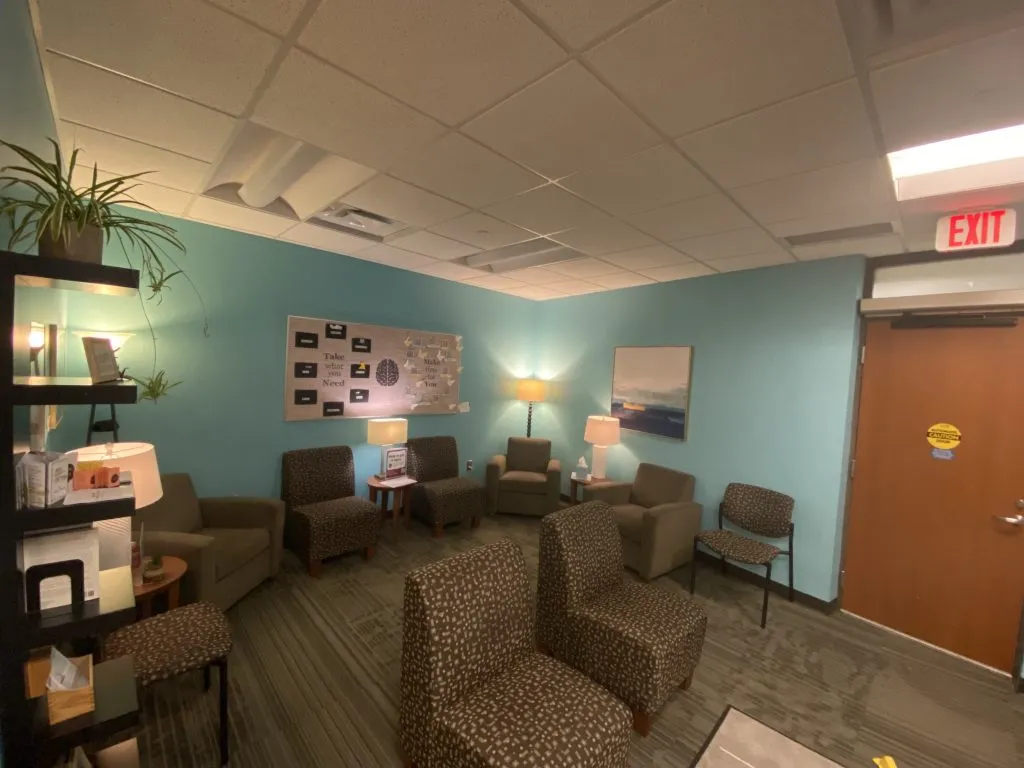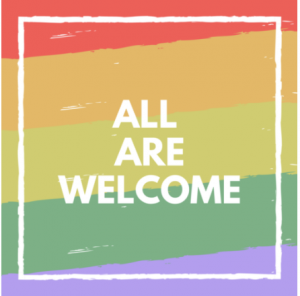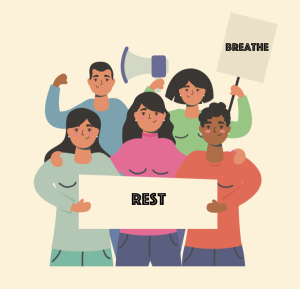Identity Specific Mental Health
Contact
Laurie Hamre Center for Health & WellnessLeonard Center Room 53 651-696-6275
651-696-6687 (fax)
health@macalester.edu

We hope to create and foster an environment that is respectful, transparent, accessible, and welcoming within communities that are underserved in mental health care. In our efforts to better support our historically marginalized community at Macalester College, we compiled identity specific mental health resources to support you in navigating your college experience. We are committed to continuing to listen, learn, and advocate with you and for you.
Resources and Offerings
-
Hamre Center Anti-Discrimination Statement The Hamre Center shares in the anger, hurt, and grief created by the disproportionate harm and violence of systems, policies, ideas, and interpersonal experiences perpetuating marginalization and all forms of oppression in our community, in our country, and around the globe. Read Hamre Center’s statement on anti-discrimination.
For resources to support you in navigating your college experience at Macalester, visit the Counseling Services Identity Specific Resource page, the Center for Disability Resources page, the Department of Multicultural Life Resource page, International Student Programs page, and/or the Career Exploration Advisor for Underrepresented Students and Equity and Access Group Career Resources.
-
Ways to Offer Feedback Your feedback is very important in helping us provide the best support to students possible. Hamre Center sends periodic student feedback surveys each year. We also want to provide the following options to share your feedback outside of those scheduled surveys. We encourage and invite feedback about our work with you, successes, and areas for improvement.
2. Direct email to Jen Jacobsen, Hamre Center Executive Director
3. Direct email to Hanin Harb, Hamre Center Mental Health Counselor / DEI Program Manager
-
Resource Lists Hamre Center’s goal is to make you aware of possible resources in the community that may be helpful. These lists are not comprehensive of all available resources, and we do not endorse any of the following services as the right option for any specific individual. You can also visit MiResource to connect with off campus mental health resources.
-
Identity Specific Counseling Groups We believe in groups as a powerful tool to support mental health and collective healing. We want to offer groups that meet the unique needs, identities, and histories of our students.
If you are interested in attending a weekly or bi-weekly group on one of these topics below or if you have another group you’d like to request, please complete this Group Interest google form. When there are at least 5 students interested, we will reach out via email with next steps.
Audience: Identity specific counseling groups are tailored to center the needs and experiences of BIPOC, International, First Generation, and/or Queer/Trans students as well as mixed and intersecting identities. The goal is to offer a welcoming and supportive environment that offers an intersectional framework (including gender identity, sexuality, class, religion, disability, citizenship, and more). Groups are facilitated by mental health counselors experienced working with these intersecting cultural and identity groups.
Identity Specific Counseling Groups
Trans, Non-Binary, and Gender Expansive Thriving
Interested in making meaningful community connections, offering and receiving support as ways of navigating challenging systems, and celebrating joy and reclaiming gender euphoria? This group is for individuals with identities within the transgender, non-binary, and gender expansive communities and will be facilitated by genderqueer counselor.
Queer/Trans* International Student Support Group
A group to provide a space for listening, community, and solidarity for those with intersecting identities who may not be heard or seen. This group is for individuals that self-identify as an international student (non-immigrant visa, dual citizenship, citizenship from another country, Green Card, DACA, and more) and individuals with identities within the queer and transgender communities.
BIPOC Grief and Relief

This group is tailored to center the needs and experiences of students that identify as Black, Indigenous, and/or people of color, which includes folks who identify as Asian, with mixed identities, and/or anyone who has been racialized as ethnic minorities. The group will focus on those struggling with grief after the death of a loved one, grief reactions and anger after an incident of community violence, or other types of losses as it pertains to being BIPOC in the United States. We will explore, process, and heal together in an atmosphere of understanding, community, and mutual support.
BIPOC Connections
 This group is tailored to center the needs and experiences of students that identify as Black, Indigenous, and/or people of color, which includes folks who identify as Asian, with mixed identities, and/or anyone who has been racialized as ethnic minorities. Students will have an opportunity to share their experiences on campus, at home, and in our community. Some of the themes we may discuss include: imposter syndrome, belongingness, enoughness, gender roles, religion and spirituality, racism, immigration, and ongoing events that impact BIPOC and international folks.
This group is tailored to center the needs and experiences of students that identify as Black, Indigenous, and/or people of color, which includes folks who identify as Asian, with mixed identities, and/or anyone who has been racialized as ethnic minorities. Students will have an opportunity to share their experiences on campus, at home, and in our community. Some of the themes we may discuss include: imposter syndrome, belongingness, enoughness, gender roles, religion and spirituality, racism, immigration, and ongoing events that impact BIPOC and international folks.Within the BIPOC and international community, there are many different ways in how we experience the world. We will work together to affirm one another, better understand ourselves and our community, explore our identities, and the systems that impact us and our mental health. We invite this variety in lived experiences and trust that each of our identities and stories will add to our group and discussions.
Here are some additional group ideas:
-BIPOC Experience of Sexual Violence Support Group
-International Student Support Group
-Mental Health and Disability Support Group
-
Identity Specific Counseling Providers There are several counseling staff at the Hamre Center for Health and Wellness with varying identities and positionalities. You are able to request specific counseling staff based on availability, therapeutic modality, gender, ethnic and racial identity, and more. Visit the About Us page to learn more about our counseling staff. When possible and available, you will be matched with a counselor that meets your needs.
-
Gender Affirming Health Care 
Transgender, genderqueer, gender fluid, gender expansive, or people outside of the gender binary identity routinely face discrimination and misunderstanding from health care providers, which prevents many of them from getting the care they need. We are committed to providing comfortable, affirming, and accessible care to our trans and genderqueer community at Macalester College. We strive to create an environment that is gender affirming and inclusive so that you feel safe in order to get the care you need. We approach gender affirming care from a culturally responsive, non-judgmental, holistic perspective, and our providers center their care around meeting you where you are at with respect, kindness, and compassion.
We provide individual counseling for students who are seeking therapeutic support related to gender identity and expression from the stages of questioning their gender identities through whatever part of the transition process – social, medical, legal, navigating systems, intrapersonal work, etc– that feels important to them. We recognize that each person has unique needs and defines what is “gender affirming” specific to themselves. Gender affirming means you’ll never have to prove your identity, though you might wish to explore it, and we can help with that. Choosing counseling can be related or unrelated to mental health concerns directly tied to gender identity. We’ll affirm who you are while also listening to your needs around how big gender is related to the support you’re seeking. Generally, the goal of individual counseling is to talk through concerns and help you heal, grow, and move towards a more satisfying and meaningful life. It is an opportunity to explore feelings, thoughts, behaviors, beliefs and build self-awareness, to receive support and guidance, to consider solutions to life’s challenges, and to set personal goals to work toward change. You will work with a trained mental health counselor in a safe, caring, and confidential environment.
For additional resources, we created a gender affirming care resource list of local medical clinics, mental health agencies, and books to support you in your journey.
Visit our Gender Affirming Care page for more information and FAQ.
-
Identity Specific Workshops  Interested in inviting a counselor to facilitate a workshop? We understand that you have limited availability, and we want to meet you where you are. For this reason, student groups, leaders, collectives, clubs, classrooms, and more can invite a counselor from the Hamre Center to present on a topic of interest and join you in your own space.
Interested in inviting a counselor to facilitate a workshop? We understand that you have limited availability, and we want to meet you where you are. For this reason, student groups, leaders, collectives, clubs, classrooms, and more can invite a counselor from the Hamre Center to present on a topic of interest and join you in your own space.Our workshops are designed to center the needs and experiences of BIPOC, International, First Generation, and/or Queer/Trans students. We will offer a welcoming and supportive environment that offers an intersectional framework (including gender identity, sexuality, class, religion, disability, citizenship, and more).
How to get started? First, you can choose a topic or we create a topic together. Second, email Hanin (she/her) at [email protected] to further discuss this opportunity.
- Managing Stress through Inclusive Skill Building: A workshop designed to help students manage stress in healthier ways. We will discuss inclusive skill building related to managing emotions, tolerating distress, communicating more effectively with others, and staying present in your own life.
- Introduction to Mindfulness
- Strengthening Community Activism through Rest and Meditation: BIPOC and QTPOC students have been at the forefront of most social movements. In an effort to make lasting change, most activists recognize the work needs to be attended to daily. This workshop is designed to provide an introduction to mindfulness practice and offers information about deep rest for student activists.
- When Home is Hard: You are probably not the same person today as you were prior to starting college, though your family may only see you as who you were before. You might also find yourself unexpectedly dealing with changes at home that happened while you were away. Returning home can be challenging. This workshop offers a space to connect with others who understand having difficult dynamics at home and an opportunity to learn coping strategies.
- Overcoming Imposter Syndrome: Have you ever felt like you’re not as capable as people think you are or felt like a fraud about to be uncovered? You may be experiencing Impostor Syndrome. In this workshop, we will share techniques for recognizing and combating Impostor Syndrome.
- Navigating Conflict – Restoring and Repairing Personal Relationships: Join this workshop to learn tools for using restorative justice principles in personal relationships.
- Prioritizing Play and Movement: A movement-based workshop to learn stress reduction and grounding skills by focusing on spontaneity, play, and laughter.
- Grief and Loss: The space will bring together students who are coping with the loss of someone in their life and are interested in learning more about the grief process. The workshop is designed to provide education and tools to navigate the unique grief process. Together, we will explore: Normal grief responses, the process of mourning: Worden’s Task of Mourning, what affects how a person experiences grief, things you can do when you are overwhelmed in grief, and finding hope by looking to small pleasures.